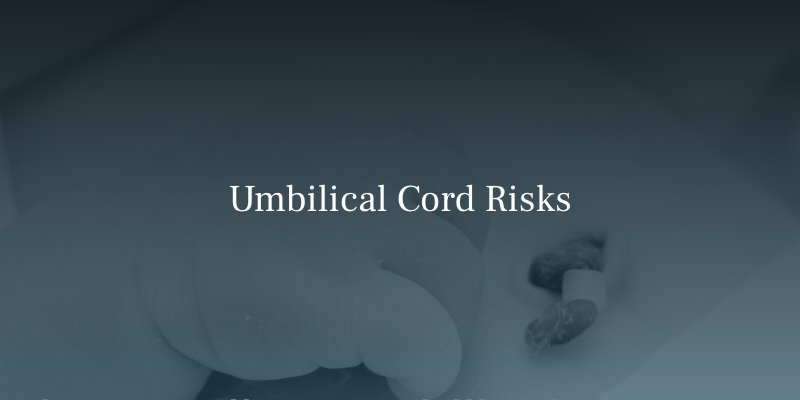Imagine you’re holding a kite on a windy day. If the string is too short, the kite can’t fly high. Similarly, a short umbilical cord in pregnancy can limit the baby’s movement and growth. But what causes short umbilical cords to form?
In this article, the medical malpractice attorneys of Hampton & King will answer this question and others about this rare condition.

What is a Short Umbilical Cord?
The umbilical cord connects the fetus to the placenta. It carries nutrients and oxygen from the mother to the baby.
The average umbilical cord measures between 50 to 60 centimeters (about 20 to 24 inches) in length at full term. If it’s shorter than 35 cm, it’s considered a short umbilical cord.
Potential issues with a short umbilical cord include:
- The baby doesn’t have as much freedom of movement in the womb
- Difficulties during labor and delivery, such as abnormal fetal positioning or cord rupture
- Reduced flow of oxygen and nutrients from the placenta to the baby
What causes short umbilical cord isn’t fully understood. Research has shown that it’s associated with fetal growth restriction and limited space in the womb. Having a short cord can be a sign that the baby has another health issue. It might mean the baby isn’t moving around much, or isn’t growing enough.
How Common are Short Umbilical Cords?
Short umbilical cords are uncommon. Studies show it happens to about 6% of delivered infants. But the exact amount may be between 6-11%. It depends on what part of the population a study looks at, and the criteria they use to define a “short” cord.
What Causes Short Umbilical Cords?
Short umbilical cords have several causes:
- Limited Fetal Movement: When the baby moves less, the cord doesn’t stretch as much.
- Placental Issues: Problems with the placenta can restrict cord growth.
- Genetic Factors: Some babies may have a short cord due to inherited traits.
- Space in the Womb: Constricted space, like in twin pregnancies, can limit cord length.
Doctors don’t always know what causes short umbilical cords. Medical experts are still studying the factors involved to better understand this condition.

Diagnosis and Treatment
Doctors usually diagnose a short umbilical cord during delivery. They may notice issues like limited fetal movement or complications during labor. Prenatal ultrasounds sometimes detect it, but not always.
Treatment focuses on managing complications. If they detect a short cord early, doctors can closely monitor the pregnancy. During labor, they might prepare for a C-section to ensure the baby’s safety. After birth, they check the baby for any signs of distress or injury.
Complications From Short Umbilical Cords
A short umbilical cord can cause birth complications. The most serious one is placental abruption. This is a condition where the placenta detaches from the uterine wall before delivery.
When the umbilical cord is very short, it’s more likely that the baby’s movements will pull on the placenta and cause placental abruption.
Placental abruption can cause severe bleeding. Both the mother and baby’s lives are at risk, so an emergency C-section is often necessary.
Other potential complications include:
- Abnormal heart rate
- Cord rupture and fetal bleeding or oxygen deprivation
- Prolonged labor because the baby can’t descend through the birth canal
- Nuchal cord (the cord wraps around the baby’s neck)
- Intrauterine growth restriction (IUGR) and low birth weight
Complications from a short umbilical cord can cause serious, lifelong conditions in the baby. These include:
- Cerebral palsy
- Hypoxic-ischemic encephalopathy (HIE)
- Miscarriage or stillbirth
- Developmental delays
- Seizure disorders
- Respiratory issues due to birth asphyxia
How to Prevent a Short Umbilical Cord
There’s no one way to prevent a short umbilical cord. Sometimes the cause of it is beyond your control. But there are certain actions you can take to make it less likely.
For example:
- Avoid exposure to harmful viruses and bacteria.
- Don’t smoke or drink alcohol
- Eat a healthy diet because it supports fetal development, including growth of the umbilical cord
- See your doctor on a regular basis so they can monitor the baby’s growth
- Exercise often to promote healthy circulation, which helps the umbilical cord develop
- Manage chronic conditions you may have, like diabetes or hypertension
- Reduce stress with relaxation techniques like deep breathing or prenatal yoga.

Are Doctors Legally Responsible for Short Umbilical Cord Injuries?
Doctors are legally responsible for short umbilical cord injuries if they fail to provide proper care during pregnancy or delivery. They should understand what causes short umbilical cords and provide care to help prevent it from causing complications.
If they fail to recognize a short cord or manage it, doctors might be liable for injuries. But if the injury was unavoidable, they’re usually not liable.
Legal responsibility depends on the circumstances. If you’re wondering whether or not you can sue your doctor, you should contact a birth injury lawyer in Houston to get an opinion on your case.




